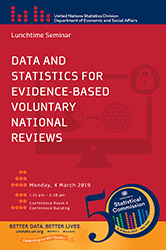United Nations Statistical Commission
Overview 50th Session (2019) Side Events
Data and Statistics for Evidence-Based Voluntary National Reviews
- Monday, 4 MAR 2019
- 1:15 – 2:30 pm
- Conference Room 4
Meeting organized by United Nations Statistics Division
Background
The 2030 Agenda for Sustainable Development stipulates reviewing the progress made on the Sustainable Development Goals (SDGs) and targets at national, regional and global levels. One of the follow-up and review mechanisms is the High-Level Political Forum (HLPF), which generally takes place under the auspices of the Economic and Social Council, and in 2019 also takes place under the General Assembly.
A key feature of the HLPF are the Voluntary National Reviews (VNRs) prepared by Member States that describe the progress they have made towards the SDGs. These reviews, prepared through a country-led process, are expected to facilitate sharing of experiences—both successes and challenges—among Member States, with a view towards accelerating the implementation of the 2030 Agenda.
Data and statistics are essential to gauge any progress. In the context of monitoring the 2030 Agenda, data and statistics are even more crucial. Due to the expansive scope of the agenda, there are topics where data has not been collected before. Also, to fulfill the ambition of leaving no one behind, the agenda requires reporting at a disaggregated level, which poses a challenge even to countries with advanced statistical systems. Meaningful reviews of the implementation of the agenda and progress towards the SDGs cannot be made without sufficient data.
It is important to examine the specific role data plays in the implementation of the 2030 Agenda and the preparation of VNRs—including, for example, how data is currently used, and how data and statistical capacity could be strengthened to support evidence-based VNRs. One important step for effective usage of data in VNRs is to strengthen the dialogue between data producers – the national statistical system – and data users, who are mainly represented by policy makers in this context. Improved collaboration between national statisticians and policy makers is essential in the context of a complex, interdisciplinary, multi stakeholder process such as the preparation of VNRs.
Objective
This side event aims to bring together national statisticians and policy makers to discuss the role data and statistics play in supporting a result-oriented and evidence-based VNR process. The lack of dialogue between these two communities has been highlighted in various international fora as one of the main challenges in ensuring a proper utilization of data and evidence-based policy making. Perspectives from both these groups are required to understand how data can be better used and to identify best practices in data usage for the VNRs.
As such, the side event hopes to encourage a meaningful dialogue on this topic and identify best practices and steps forward. This information can be translated into a resource/guidance material that member states can use during their VNR preparations. The data perspective on VNRs can also be shared during preparatory workshops and other opportunities where UNSD engages with Member States on VNR related issues.
Structure of the side event (detailed agenda follows at the end of the concept note)
The side event will be structured as a panel discussion with a panel consisting of 6-8 panelists, evenly divided between national statisticians and policy makers from countries who have either recently presented their VNR to the HLPF or are preparing to present at the 2019 event. The session will start with a short introduction of the VNR process. Then the chair will ask each panelist a round of key questions and each panelist will provide brief interventions. This will be followed by a discussion and a Q/A session with the audience.
The panelists should touch on their experiences of:
- Using/providing data for the VNRs (both data user and producer perspective)
- How they think data and statistics can improve/contribute to the VNRs
- Mechanisms of coordination across the statistical system (NSS) and between NSS and policy makers, particularly what worked well and what did not work so well
- Things they would do differently, or areas where they see room for improvements
More information
For additional information about this side event, please contact:
Sokol Vako (vako@un.org) and Shaswat Sapkota (sapkotas@un.org)
Development Data and Outreach Branch
United Nations Statistics Division
Department of Economic and Social Affairs
-
1:15 - 1:20
Opening remarks:
Chair: Ms. Ola Awad, President of the Palestinian Central Bureau of Statistics. -
1:20 - 1:30
Introduction Presentation on VNR process
Ms. Irena Zubcevic, Chief, Intergovernmental Policy and Review Branch, Office of Intergovernmental Support and Coordination for Sustainable Development, UNDESA -
1:30 - 1:35
Q&A on VNR process
-
1:35 - 2:15
Panel Discussion
- Albania:
- Mrs. Delina Ibrahimaj, Director General of Albanian Institute of Statistics (INSTAT)
- Ms. Ingrid Prizreni, First Secretary of Permanent Mission of the Republic of Albania to the United Nations
- Colombia:
- Mr. Juan Daniel Oviedo Arango, Director General of Departamento
- Ambassador Francisco Gonzalez, Deputy Permanent Representative of Colombia to the United Nations
- Ghana:
- Mr. Omar Seidu, Head of Demographic Statistics and Coordinator of data for SDGs in Ghana, Ghana Statistical Service
- Representative from mission, TBC
- Philippines:
- Ms. Lisa Bersales, National Statistician, Philippine Statistics Authority
- Representative from mission, TBC
- 2:15 - 2:30 Open discussion and closing remarks
